During a recent visit to Rosyth, Armed Forces Minister Luke Pollard spoke to the UK Defence Journal under the hull of HMS Active after attending the steel-cutting ceremony for HMS Formidable.
The conversation shed light on the significance of the Type 31 frigates to both the Royal Navy and the UK’s shipbuilding industry, as well as the broader aim of the upcoming defence review under the new government.
We were in Rosyth for the steel cutting of HMS Formidable, where @geoallison spoke to Armed Forces Minister @LukePollard MP for the @UKDefJournal. The conversation covered the role of the Type 31 frigates, the defence review, and the future of UK shipbuilding. Listen now! pic.twitter.com/Zkr90JjncI
— UK Defence Journal (@UKDefJournal) October 10, 2024
A New Workhorse for the Royal Navy
When asked about the value of these ships to the future capabilities of the Royal Navy, Pollard made clear to me the pivotal role of the Type 31 frigates in the Royal Navy’s future, describing them as the “new workhorses” of the fleet. He highlighted their global deployment and strategic importance, stating:
“The Type 31s will be the new workhorses of the Royal Navy. They’ll be sailing around the world, globally deployed, protecting British interests, our sovereignty, and also being able to deter aggression and defeat it if necessary. These are really important ships for the Royal Navy, and combined with the Type 26s that are being built on the other side of Scotland, they will form the backbone of the Royal Navy fleet for decades to come.”
Pollard also stressed the importance of not only equipping the Royal Navy with advanced ships but also investing in skills and the workforce:
“That’s why it’s not only important that we get the right kit and capability, but we build the skills that we need as well. Because looking at the steel behind me, this is impressive, and seeing them come together is really inspiring. But actually, for me as the Minister for the Armed Forces, it’s seeing the people behind it—the workforce, especially the apprentices, people who are choosing to make their career in heavy engineering in support of our Royal Navy.”
The Strategic Defence Review
With the strategic defence review on the horizon, Pollard addressed questions about the future of the UK’s naval programmes, including potential expansions beyond the Type 31. He acknowledged the substantial investment in shipbuilding infrastructure at Rosyth but remained measured in his response regarding future ship classes:
“As a new government, one of the first actions was the Prime Minister launching this strategic defence review. This is a serious review that recognises not only that the world is a more difficult place, and that there are new and evolving threats to the United Kingdom and our allies, but that after many years, especially with lots of gifting to our friends in Ukraine, which was exactly the right thing to do, the UK armed forces have far too many capability gaps.”
Pollard detailed the focus of the review and its expected timeline:
“So, what we’ve asked Lord Robertson to do is to conduct a defence review to not only analyse the threats we’re facing, but what kind of shape our forces will need to be. That review will report in the first half of next year. And in parallel to that, we’re working towards achieving 2.5% of GDP being spent on defence. That’ll be announced by the Chancellor at a fiscal event in the future.”
Preparing for Future Challenges
Pollard’s vision for the Royal Navy’s future involves bolstering the UK’s ability to deter conflict and ensuring that both personnel and equipment are prepared for emerging threats. He expressed confidence in the role of the new frigates in shaping the Royal Navy’s operational capability:
“Combined, what we’re doing is looking to reshape our armed forces to make sure that we can deter aggression towards the UK and our allies and defeat it if necessary. That means more investment in our people, that means more investment in kit and equipment, but it means making sure we have the right kit and equipment in the right places.
And frigates like this, the Type 31, the Type 26, will form the backbone of the Royal Navy. I’m absolutely confident that that will be a future that we can take real pride in. But I look forward to seeing the outcome of Lord Robertson’s defence review in the months ahead.”
The New Job
Reflecting on his new role and the opportunities it presents, Pollard spoke passionately about his commitment to improving the conditions for service members and building a stronger defence industry:
“Oh, I’m loving the job. As a Navy brat and as someone who represents Devonport, being able to get stuck in with some of the changes that we need. Being in opposition is hugely frustrating. It feels like you’re shouting into the wind frequently. But the ability that we now have to create improvements to the environment that start valuing our people more, renewing the contract between the nation and those who serve—some of it’s been eroded over so many years—but also getting our armed forces in a fit and proper state, ready to deter aggression, I think it’s really important.”
Pollard further highlighted the impact of the war in Ukraine on the UK’s defence posture:
“And we’re seeing with the ongoing war in Ukraine, new threats facing us, that actually that work, that fresh energy that I think the new government’s bringing to defence is much needed. And I hope that we’ll be creating an environment where more people are now thinking of a career in defence, not just in uniform but also in the civilian roles that support the fleet, support our armed forces.”


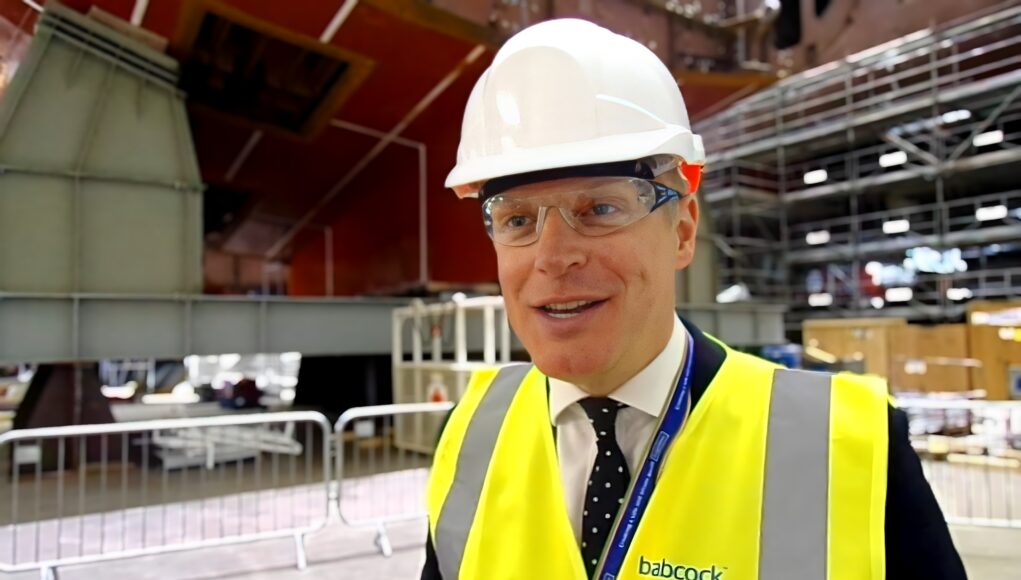
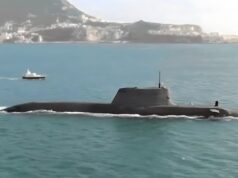
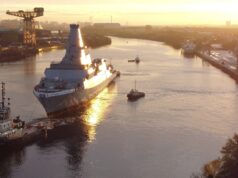
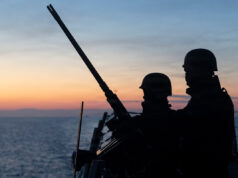
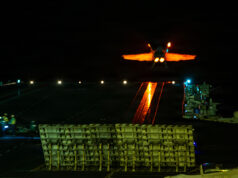
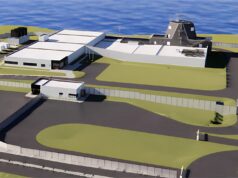
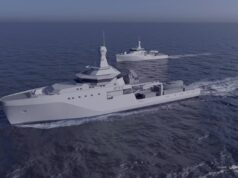
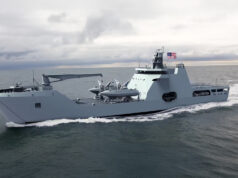
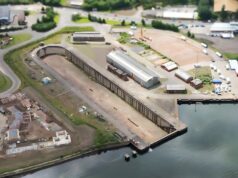
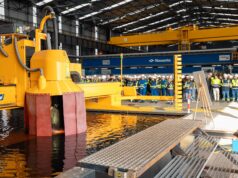
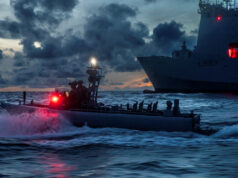

I really can’t see the defence review altering the 13 frigate plan but I can’t imagine money being found for 5 T32’s. I’m guessing work moves up on the MRSS and we end up with 6 being built at Rosyth.
I can’t help but think that the FSS is at risk. The carriers can carry a lot of munitions, RFA issues are huge and laying up Fort Vic means the skills to do solid stores RASing will be long gone.
Good scoop! Slightly tongue in cheek but did you ask him how many CAMM these ships will have and any chance for a few more? 😆
I doubt he knows what CAMM are. He’s a career politician that’s done nothing else.
Great you got to speak to him but he didn’t answer the questions if we have more type 31/32 or something else that the yard will build. As per the shipbuilding strategy we should just keep building more and then selling them at 10/15 years age to other nations or sell new. Continual steady investment is what is needed not boom and bust. Build up the stock levels then find people to take them.
In reality we need to have a fleet of escorts closer to 30 than 20, that should be a core aim of the defence review.
Agree we need more escorts but we need more the 30 if we are to properly escort two amphib groups and one or two carrier strike groups. Then there will be the Atlantic convoys that no one talks about…
My comment applies to every NATO ally as well.
Cheers CR
Never gunna happen, platforms are so expensive now we wouldnt be able to ever run WW2 style convoys.
War would be intense for 3-6months then once all the high tech weapons and platforms are gone it settles into stalemate
Not necessarily. War production will be ramped up as has been in Russia. The west is struggling to ramp up production because we are helping a third party not doing it for ourselves. During WW2 defence spending hit 52% of GDP – that would by a lot of production capacity in today’s world but it would require greater industrial capacity at the start than the UK, at least, has. Seeing the ship yards investing is cause for a glimmer of optimism but far more is needed across the defence industrial complex and in re-industrialisation in general.
I would also point out that the ‘platforms’ are not the cost driver, it is techie wizardry that goes in them, that and the peacetime procurement numbers.
Modern war would be hugely expensive, true enough, but how it would pan out is very unpredictable. Whoever has the most treasure, industrial capacity and tech will have a significant advantage. Tech the west has but as our support for Ukraine has demonstrated treasure and industrial capacity come up short and they are interdependent and bound to our current economic model which, I believe, gives China a potential advantage…
As for the WW2 style convoys, I’m not convinced that there will not be a need to escort vital supplies. I agree that that are not enough escorts to undertake that type of tasking, but is potentially a weakness that we are ignoring. I would also suggest that the way in which we escort carriers gives a clue as to how we would need to escort merchant ships as the merchantmen would face the same threats.
Cheers CR
Report from the US navy itself said that in full China US war modern weapons would be used up optimistically by 6 months. At up to £3million a cruise and up to £16million for anti ballistic weapons modern war is unaffordable. That’s what Ukraine is showing that the 20 century nato way of war is unviable against a nation like China that can exhaust us with cheap drones and billions of people. Our billion pound ships are no longer viable
Fed up with hearing about ‘Global Britain’. We’re a middle-ranked European power and that should be our focus, not all this ‘Caribbean, East of Suez’ cobblers. We need CSG for the Atlantic (North and South) and the GIUK Gap. Not pratting about in the South China Seas.
That’s alright if you want to abandon our responsibilities for overseas territories in the pacific, Caribbean and down south.
That’s of course if we don’t give them all away!
Actually yes, we should worry about the Atlantic (North & South, Ascension, Falklands), GIUK, North Sea and Over the Horizon support for the Baltic. Keep Cyprus and Gibraltar but let everything else go. The overseas territories are nothing more than tax havens who otherwise resent us (quite rightly probably) for past Colonialism so cut them loose. Let the Pacific be the concern of those actually in, or adjacent to, the Pacific. Stop playing the role of Community Support Officer to the Global American Policeman.
You have missed the protests from the Chago islanders who want to remain a British protectorate then! There are countries out there who are proud to have links with the monarchy and Britain despite what the downers say!
UK still has territory in the midst of the Pacific. If you think NZ will formally take it over, think again. Then there is the Gurkha troops in Brunei. Militarily base in the middle of the Indian Ocean, even under the recent agreements will still exist for the next 99 years. Not operating East of Suez has never actually happened. Reduced, certainly, but it never stopped. Now an agreement under AUKUS to base a SSN in rotation with US in Australia.
Nations like Australia, Canada, India, New Zealand etc supported UK through two world wars. Like most relationships it’s a two way thing. Bailing on family when things look a little rough is not what it is about.
Sorry, meant to be a reply to Phil.
You had me worried there👍😂
No, we’re a top rank European power (if not the top Euro power…) UK is top of middle rank global power. We have nukes, we have a permanent seat on the security council, we have pivotal treaty obligations around the world, our economy is one of the world’s biggest, London is still one of the main trading and economic hubs, our cultural and media power is top tier. If you like the world order as it is then the Royal Navy needs to be global.
Bravo. Well said.
100%, well put!
While I’m inclined to agree that nearer the U.K. is the most important, being able to deploy globally is vitally important.
The goal for the navy needs to be enough ships, aircraft, submarines for one carrier group, 2 amphibious groups, a couple for U.K. patrol, Atlantic patrol north, Atlantic patrol south, gulf patrol, far east patrol and finally 3 ships ready to sail for lone missions, escorting duties etc.
with the upcoming new deployment of 1-2 submarines to Australia these could also do with a frigate, destroyer deployment also.
That adds up to 25-35 proper escort’s depending on maintenance, using patrol ships etc.
Don’t forget Pitcairn, Dulcie, Henderson and Oeno, the British Overseas Territories in the Southern Ocean. Or South Georgia and the South Sandwich islands – all are gateways to Antarctica. And British.
The United Kingdom and before that Great Britain and Ireland, was never a major power. It was a ‘world power’ by virtue of its systems that translated seamlessly from governance and trade to military operations where we often used locally raised formations to gain and hold territory which we promptly gave a name to and rights and titles. It’s something no one could hope to do today and obviously it wasn’t successful everywhere. But I have lived through many ‘Britain is finished’ episodes and somehow we ride them out. It’s a bit like arguing with some progressive who cannot answer the question ‘If everything is so bad, why do so many wish to come here?’ That said, like everyone else around these parts I believe the run down of our armed forces and supporting structures to be a great scandal.
Good to see Mr Pollard’s enthusiasm for the job.
Yes. I was about to post that he said nothing beyond the usual soundbytes and offered nothing.
But, fair enough, he seems keen.
I sense there is good will for defence but that will not be enough to fill the ‘capability’ gaps. I see Fort Vic is being put into longterm lay up and that csg2025 solid stores will be HMNoS Maud. Given the H&W situation FSS is looking at risk. F-35 numbers looking vulnerable as is MRSS. Pollard says the T31 frigates ( and T26) will be the backbone of the RN. Amphibious capability looking very vulnerable.
And they’ll spin that as a win.
In reality, Carrier aviation, SSN, Amphibious capability and a capable RFA backing it up make a true blue water navy.
FSS should have been built in Korea years ago, like the Tides. Our yards are at capacity.
As usual, everyone jumps up and down about UK build being prime and so we have nothing. I remember the debates here over whether they are classed as warships or not re overseas build.
We are now facing nothing at all.
I’d have preferred the RN have a capability, and a ship, than a UK built one that they have to wait 20 years or more for and which many never be built.
Apparently the cost of the required Lloyds fire and ammunition standards for Fort Vic are prohibitive. So a solid stores ‘capability gap’ is here. This places geographic limits on ‘global’ carrier strike and amphibious capability without allied help. Hopefully these are temporary. If FSS is not cancelled it can be built abroad. We are able to continue our current commitment to bi-annual csg freedom of navigation tours; sharing the rota with French and Italian carriers and German, Australian, US singleton escort transits.
The Rivers will continue our ‘defence engagement’ level presence: T31 could follow on.
The real question is what is the future of UK amphibious capability? Currently do we really have the troops RM and/or Army to undertake and sustain a significant expeditionary operation? Not to mention the RFA situation. Our problem isn’t LPDs; these are good for a few years. It’s recruitment. Don’t we already have an amphibious ‘capability gap’?
I notice the article on T32 still being in the concept stage. What does this mean? Do we really need to design and build 3 custom designed MCM motherships when T31 and T26 frigate building is just getting into gear? Wouldn’t it be wiser to do a deal on Kongsberg Vanguards and use the precious shipbuilding capacity to push on with increasing frigate numbers – significantly – and fixing the recruitment issues in both navy and army. Secure the Arctic, Atlantic, Gulf, East Africa and Gulf of Guinea. Time enough then, to think about MRSS. Just my take.
What do you define as “significant”? Brigade level?
We can deploy, but it would bust the army as the rule of 5 is gone with so few Brigades and their CS CSS element, so not enduring.
We cannot sustain a Brigade in Estonia now.
A Divisional size best effort from all 3 services is possible for a time, but after that is it, and would cause havoc for years after.
We have an amphibious capability gap if we are talking deploying at the level 3 Cdo planned previously. If they follow the LRG concept it is sort of doable, and even then is full of holes.
T32 should be a Batch 2 of T31, nothing more.
The MCM mothers I always hoped would be another commercial OTS solution but I read here there are problems with it. I would not want to see our yards building the mothers, just buy the Kongsberg ones.
Agree on Frigate numbers and on recruitment, but for me, escorts are still only the bread around the filling, which are the niche assets, Carriers, RFA, SSN, Ampibs.
So, “significant” was in the context of frigates; specifically T31. I would like to see the defence review commit to a minimum of an additional 5-8 x T31 plus 3 x COTS MCM.
I defer to your knowledge on army orbat and numbers but the ability to sustain a brigade sized deployment sounds sensible. The priority geography looks like mainland Europe, then Africa, with France. Could we and France end up as peace keepers in the Lebanon?
Interestingly, I think we may have mirror image views of the structure of the RN and where we should focus rebuilding. I think that the foundations are OPV and GP frigate numbers and that ( after T26 ASW) this is where we should prioritise spend if money is tight. Build bottom up from the presence, constabulary, engagement, and intelligence functions of the River 2s. T31 is next layer- add sea control, deterrence, raiding. LRG ( sister ship for Argus?) is next layer- add HDR/ intervention etc.
Hi Daniele,
Whilst I take your general point that we are in dire straights I would suggest that if the current travails with H&W can be navigated through (e.g. Babcock and / or others buys them out) then I would prefer to see the FSS built in the UK. I accept it is a gapped capability at the moment but we are were we are (sadly and stupidly).
However, industrial capacity is a critical enabler in the event of a major war, see Ukraine support or lack of it. So if we are in a new pre-war era I want to see us investing in our military industrial base urgently, before the poop hits the fan…
We do have a little time left I think, but not much…
Cheers CR
George it’s great to see you over on the East side of the Central Belt and able ask questions to the Minister. Did you ask about the RFA manning crisis ? Or could you perhaps do an article about this because it doesn’t seem be getting the coverage it needs.
UKDJ does have a habit of having its articles picked up by the mainstream Press, I haven’t seen anything mainstream about what’s going on.
The silence in the media as the RFA falls apart is amazing.
Or is it? Depending on the media.
The UKDJ have covered the RFA crisis extensively, they’re often first with some of the issues.
We have indeed.
History question. Has there ever been a strategic defence review that expanded the military rather than cut it?
Sandys, 1966, Nott, Mason, Options for Change, SDSR 2010 and 2003 (despite Blair starting two wars, he thought some cuts might be in order….).
Really only SDR 1998 and 2015 (albeit very modest) actually increased our armed forces.
Congratulations on getting this face-to-face interview George. Now you can hold the government to its ‘fine words’. Well done.